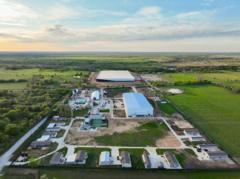Tensions simmer between South Africa and the new US administration regarding land seizure laws. President Ramaphosa reached out to Elon Musk to explain the legal framework, as Trump threatens funding cuts citing allegations of misuse against marginal communities.
South Africa's President Engages Elon Musk Amidst Trump-Linked Land Law Controversy

South Africa's President Engages Elon Musk Amidst Trump-Linked Land Law Controversy
President Cyril Ramaphosa seeks to clarify South Africa's land expropriation laws following a tweet storm from US President Donald Trump and tech mogul Elon Musk.
South Africa's President Cyril Ramaphosa has taken steps to ease tensions arising from criticism regarding a new land law by placing a call to tech entrepreneur Elon Musk. Musk, a prominent figure in the tech industry and an adviser to US President Donald Trump, joined the conversation on social media to express discontent over allegations surrounding South Africa's legislative changes regarding land ownership.
The backdrop of this communication revolves around a land expropriation law signed by Ramaphosa that permits the confiscation of land without compensation, but only under the conditions deemed "just and equitable." Much of the contention lies within the historical context of land ownership, where the majority of agriculture in South Africa remains under white ownership nearly three decades after the end of apartheid.
Over the weekend, President Trump utilized his social media platform to threaten to withhold future funding to South Africa until a comprehensive inquiry into these land policies was conducted. Trump criticized Ramaphosa's administration for alleged discriminatory practices, claiming that South Africa was "confiscating land" and failing to treat various demographics fairly. In response, Ramaphosa’s administration clarified that no land had been taken without due process and reaffirmed its commitment to the rule of law and equality as prominent tenets of the nation's constitution.
The ongoing land ownership issue has plagued South Africa for over a century, tracing back to the 1913 Natives Land Act which severely restricted property rights for the black majority, consolidating land ownership with the white minority. Historical grievances around land rights have sparked significant debate and anger among citizens, escalating demands for more swift and meaningful reforms.
Critics of the new law warn of potential disastrous outcomes, echoing fears reminiscent of Zimbabwe's controversial land seizures that destabilized its economy and deterred foreign investment. The delicate balance between addressing past injustices and ensuring economic stability remains a contentious theme as South Africa navigates these reforms, particularly amid scrutiny from international figures and institutions.



















